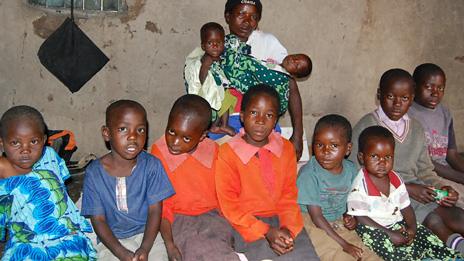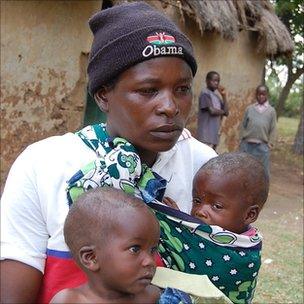Kenyan mother 'cursed' with six sets of twins
- Published

Gladys Bulinya at home with five of her six sets of twins
Most women would struggle to cope with six sets of twins but for Gladys Bulinya it is even more difficult - as many people in her part of Kenya think twins are cursed.
Her relatives will have nothing to do with her, and her husband left her, fearing she was jinxed, after the sixth pair of twins arrived last year.
So the 35-year-old lives alone with 10 of her 12 children in a one-roomed grass-thatched house, a few miles from the shore of Lake Victoria.
Sitting outside her small home in the village of Nzoia, she recites the birthdays of her children with ease.
"John and James were born in 1993," she starts, shading her eyes from the sun's rays.
She explains that she got pregnant at high school - but her boyfriend was too young to marry her.
Her sorrow then turned to shock, when her own family ordered her to leave the babies at the district hospital for adoption.
They told her that the Bukusu people, to which her family belongs, believe twins bring bad luck - and that unless one of them dies, it means certain death for one or both parents.
The Bukusu tradition of eliminating the second twin is no longer practised, though occasional cases of infanticide are still reported in rural areas of western Kenya.
Forced marriage
Luckily, Ms Bulinya says, when her boyfriend's father learned the twins had been abandoned, he took them in and has cared for them ever since. (He is from a different ethnic group, the Kalenjin.)
But her troubles did not stop there. Five years later she fell in love with and married a primary school teacher.
She was living with his family when she gave birth to her second set of twins, Duncan and Dennis.
Fearing she had brought them a bad omen - and that someone would die - her in-laws chased her away.
"I was put on a motorcycle taxi with my twins and sent to my father's home," she says.
Yet again, however, her family had no sympathy. Still considering her cursed, they did not allow her on to their property.
Instead, they quickly organised another marriage for her, to a man 20 years her senior.
He agreed to the alliance, she says, as he had not expected to marry at his age.
But more twins followed.
"Mercy and Faith were born in 2003 and Carren and Ivy in 2005, Purpose and Swin in 2007," Ms Bulinya says.
It was the arrival of Baraka and Prince last year, that led to her husband walking out.
"I now have to do lots of odd jobs to feed my 10 children because I do not know where he is, and he is also too old to work even if he were around," she says.
'No regrets'
A few of the children attend the local junior school.

Gladys Bulinya says she misses her eldest boys - and last saw them two years ago
The five-year-old girls take it in turns to care for five-month-old Baraka and Prince, while their mother is out weeding plots or doing washing for neighbours.
Eleven-year-old Dennis has been given a scholarship to a private boarding school nearby, while his twin Duncan looks after the livestock for a retired teacher.
"I have decided to sponsor one of them - that is all I can afford," Margaret Khanyunya, director of St Iddah Academy, told the BBC.
Duncan's monthly ration of maize for his herding duties is enough to feed the rest of the family.
So the family of twins, often ostracised by the community, just about scrapes a living.
But even Ms Khanyunya, a benefactor, is critical of Ms Bulinya's situation.
"The lady should have undergone sterilisation after discovering that men were using and dumping her," she says.
Ms Bulinya says she has no regrets and sees all her children as God's blessings.
However, she admits that she has now reluctantly been sterilised, "against the wishes of my church", as she could not cope with any more children.
"I am a Catholic. When I made the decision I asked for God's forgiveness and I am sure God understands and will forgive me for doing that."
The one thing that really upsets her, she says, is the absence of her 17-year-old twins.
She weeps when she recalls their last meeting, two years ago, at their circumcision, a ceremony which marks a teenage boy's rite of passage to a man.
At the gathering, each parent must hand over their son to the community elders for the circumcision.
"I was invited to the occasion and asked twice to pick my sons from among the crowd of 30 boys," she explains.
"In both cases I picked the wrong children and my heart still bleeds each time I think of that day."